Jena, a small university town nestled in a forested valley in the Free State of Thuringia, enjoys a nearly romantic setting. First-time visitors find it hard to imagine that the city of 110,000 is a long-standing global center of the optics industry. But anyone who joins Jenoptik’s CEO Stefan Traeger on the roof terrace of the Ernst Abbe high-rise building quickly senses a few salient qualities. Things might be a bit smaller and more personal here than in Silicon Valley or Shanghai, for example, but the atmosphere at Jenoptik’s headquarters exudes the positive vibrant appeal of a “new German economy” driven by highly connected engineering excellence—along with a self-assured but solidly down-to-earth approach.
That was not always the case. When Traeger, a physicist born in 1967, became the chairman of the executive board in May of 2017, the company’s decades-long culture began to change. Traeger is convinced that Jenoptik can only forge ahead into a successful future if it is willing to embrace both a new era and the will to play a major long-term role on the world market.
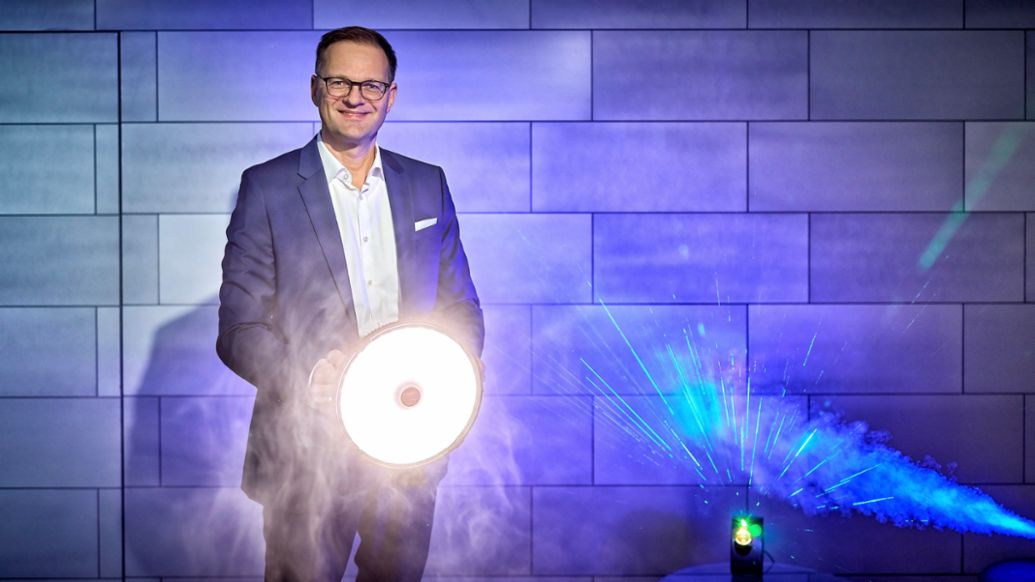
When Germany was divided after World War II, Jena was in the German Democratic Republic (GDR) with its socialist government and hermetically sealed borders from 1949 to 1990. Traeger, who was born and raised in Jena, gained his first professional experience with Carl Zeiss, the company that gave rise to today’s Jenoptik.
No semiconductors without Jenoptik?
Traeger arrived with a clear plan that he has pursued systematically since day one, fueled by generous levels of natural charisma and pride. The plan is to transform the company from a broad-based industrial conglomerate into a focused technology enterprise. Leaner, more efficient, directed toward its core areas of expertise, and with a premium on innovation—these are the guiding principles for both the present and the future. Jenoptik, which is listed on the stock exchange, has an enormous lever at its disposal. “The world needs ever more semiconductors,” Traeger notes. “But there wouldn’t be many at all without our products. Most of the chips in this world will run into a Jenoptik product somewhere in their manufacturing processes.” One example would be the high-end lenses from Jena that precisely and reliably inspect semiconductor structures during production processes. Instruments of this type make Jenoptik a nearly indispensable production and systems partner. The company, in other words, has an unchallenged pole position.
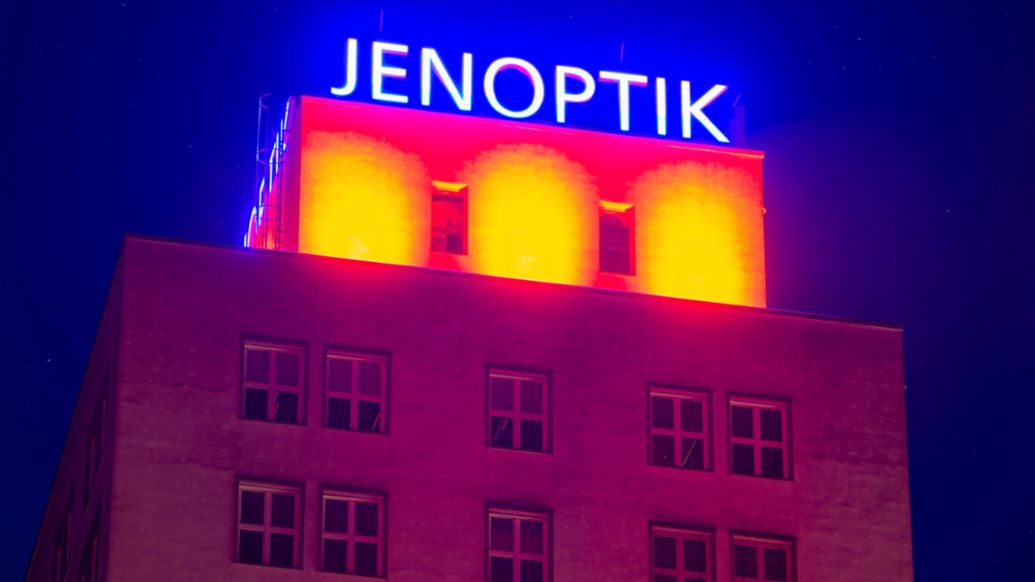
Jenoptik currently has around 4,900 employees worldwide, around one-third of whom work at its headquarters in Thuringia. In 2021, the company posted sales of nearly 900 million euros. It has come through the Covid pandemic remarkably well thus far, without closing its facilities and without a serious decline in sales. It’s extremely high-quality standards are relevant here, of course. High-performance optics is an industry in which quality can stand or fall with a tiny speck of dust. “There’s hardly anywhere safer than the cleanrooms where we make our products,” says Traeger.
In addition to companies in the semiconductor equipment sector, Jenoptik’s customers come from the automotive, automotive supply, medical technology, and aviation and aeronautics industries. Its products include lasers that perforate and cut door cladding in car production processes, devices that measure speed in traffic control systems, and components for space travel. One highlight is found in Perseverance, the remote-controlled Mars rover. At Jenoptik’s site in Jupiter, Florida, engineers developed, installed, and tested different types of highly unusual and modern lenses for it. Dust- and temperature-resistant down to minus 135 degrees Celsius, they are what make the brilliant images of the red planet possible. But Jenoptik specialists also have a hand in our ubiquitous everyday smartphones. The company does not make the phones’ optical components, but it does ensure the quality of their camera lenses in production processes. “Digitalization would hardly be possible without us,” remarks Traeger.
"More light"—An appealing vision
Jenoptik’s corporate claim is “More Light.” And its vision is “Brighter Futures with the Power of Light.” The company wants to enter a new era: the age of light. It is therefore concentrating on the core field of photonics: optical processes that transmit, store, and process information. Its vision is firmly anchored in this field. And the focus is on research and development—in Jena and beyond. “By and large I try to promote the aim of not developing everything here at our main site but also in Shanghai and Jupiter. Especially China is more than just a sales market for us. There, too, we encourage the creative potential in our specialists that we need for innovations.” In developing new products, the company listens very carefully to the ideas of its clients. “In our role as specialists, we’re all the more successful when we can help our customers convert complex problems of a photonic nature into products that can be industrialized,” he says. But above and beyond that, the CEO is interested in achieving and maintaining the right balance between successful existing products and promising innovations. “We want to direct even more of our energies to areas where we’re really needed. At the same time, we’re thinking about what might not belong to our core business anymore. Maybe we should be drawing back from a few things in the future.”
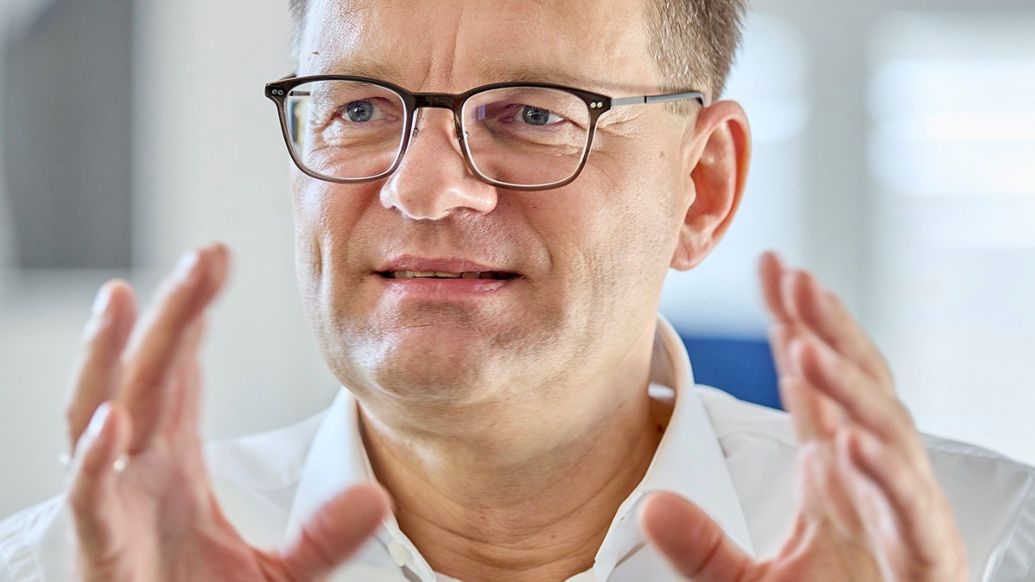
That is the reason Jenoptik divested from its non-optical measurement systems for grinding processes. The capital thereby freed up can help the company position itself internationally, because Traeger views the Americas and Asia as “strategic growth regions.” It can also go into companies like Berliner Glas Medical, which makes high-precision optical components for medical systems—a recent acquisition that is a nearly perfect fit for the portfolio.
When Traeger joined Jenoptik in 2017, he and a new culture moved into the almost modest looking “tower,” as the company’s administrative building is known to employees. A culture of openness. Traeger sees value in outside ideas, also in clever minds and connections with other companies, both in the local technology park and abroad. Moreover, this openness accommodates a vital culture of mistakes. Traeger prefers that his employees “just do it” instead of “waiting for the next instruction from the boss,” as apparently often used to be the case. He also enjoys going to the cafeteria with employees from different departments—“in order to learn something.” He has a practical mind, preferring to hear about what is going on rather than “watch a constant stream of PowerPoint presentations with managers.” In the old days, all important decisions were made in the “tower.” In the eyes of the current CEO, that unnecessarily slowed down a good number of developments.
Photons for processing data
Jenoptik’s CEO appears to find it easier than most people to foster needed processes of change. In addition to a naturally open and empathetic disposition, he is helped by his roots in Jena and his long-term familiarity with the highly specialized photonics industry. “It’s probably true that people are more willing to put up with inconvenient but needed changes from me than from someone who comes from a different place and field. Even if I sometimes must voice unpleasant truths, I still count as ‘one of us.’ It’s important that we keep Jenoptik as its own independent company. It might be the last one of its size in eastern Germany.” Traeger points to the two-meter illuminated blue letters spelling JENOPTIK on the top of the building. “We mustn’t ever let these lights go out. I want to do my part to ensure that. I owe that to the town where I was born.”
Those words might look sentimental on paper. But that’s not how they’re meant. On the contrary. Before coming home to Jena, Traeger explored a lot of the world and the industry. His entrepreneurial gaze extends far down the road. “The next logical evolutionary step in data processing is to replace electrons with photons. Where electronic processes have already run up against limits, we’ll be able to do things with light,” he says. It stands to reason, therefore, that he has long since been looking at the “next level,” namely quantum technology. “Jenoptik has to be right out in front there.” Anyone who meets this engaging, plainspoken physicist can well imagine that the desired quantum leap will indeed take place.
Understanding and involving people
Porsche Consulting supported Jenoptik in changing its course in many areas, including making its administrative and organizational structures more efficient. The photonic specialists' 2022 strategy is based not only on the idea of "More Light" but also on transforming from an industrial conglomerate to a focused technology corporation. A team of experts from the Porsche Consulting management consultancy was charged with helping to put the strategy into practice and with setting a new course on several different levels. The first tasks consisted of dismantling duplicate processes and optimizing governance structures. Digitalization was used to strongly increase administrative efficiency. At the same time, research and development were consolidated into a single division. In reorienting and focusing his company, CEO Stefan Traeger valued a view from outside and temporary support from neutral advisors with practical experience and the ability to empathize. "The consulting team understood and involved the people at Jenoptik," he says. "Our collaboration with Porsche Consulting has led to a shared success."
Info
Text first published in Porsche Consulting Magazine.
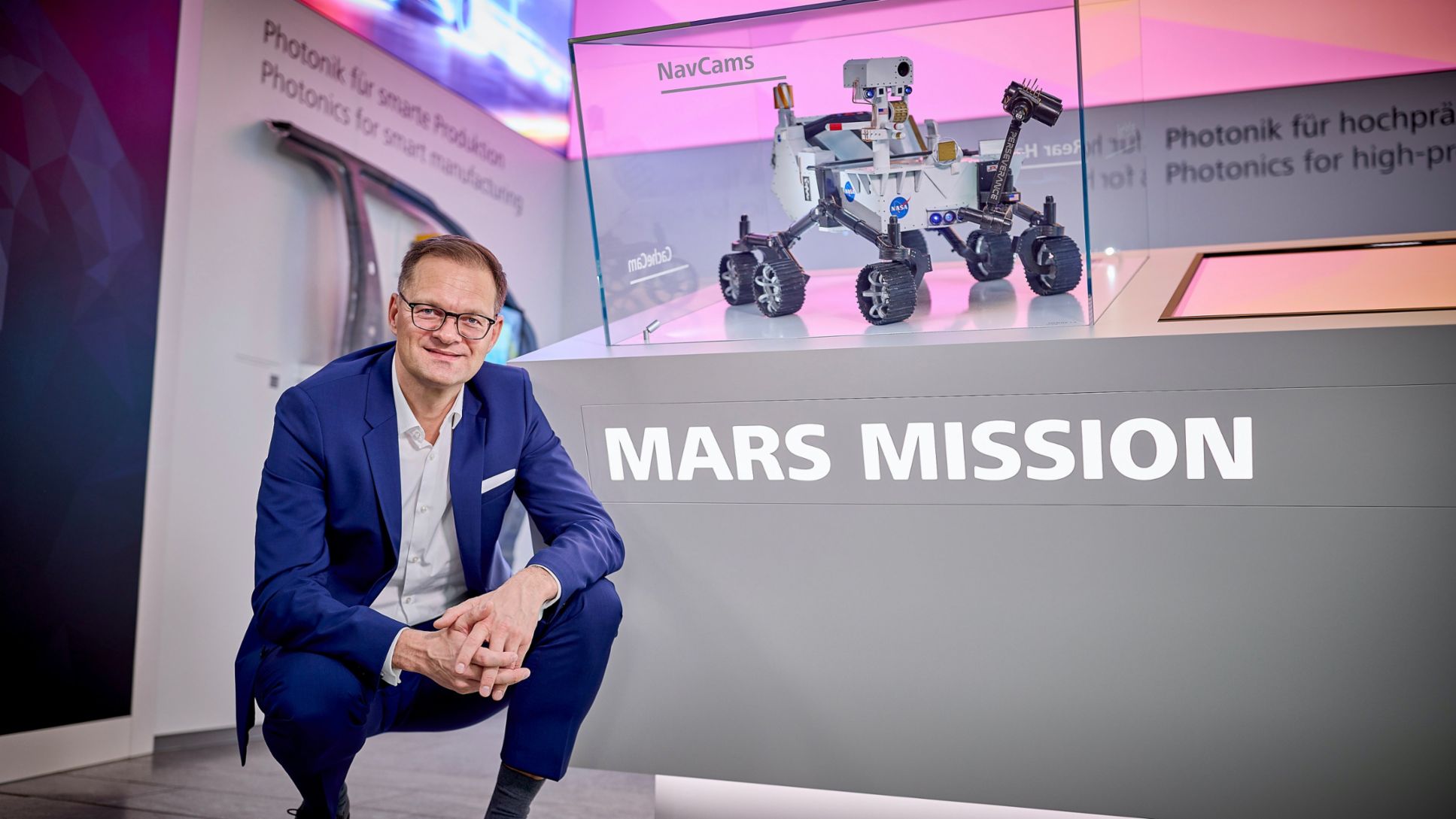
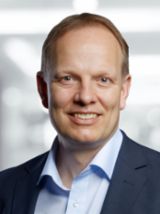
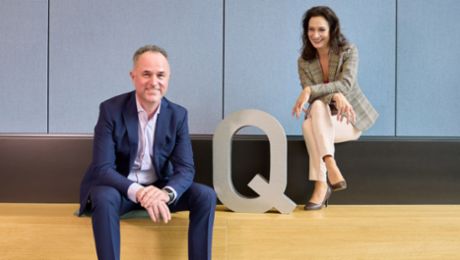


-2.jpg/jcr:content/STR_HydrogenD328%20(1)%202.jpg)